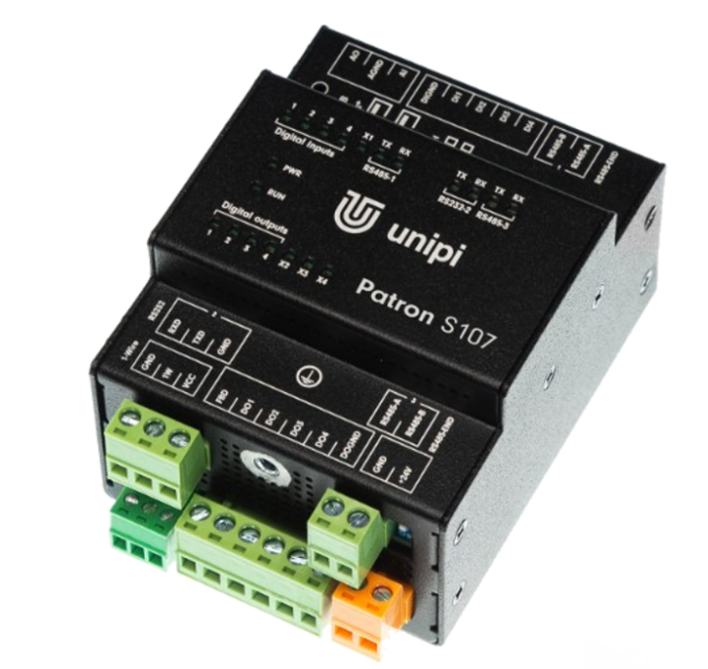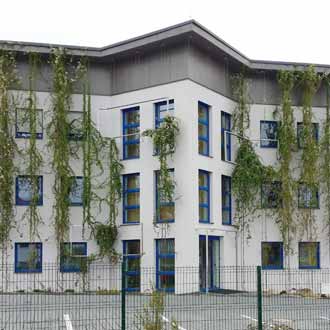Interview #11: UniPi and IoT gateways
20 September 2021
Source: More on Soundcloud

Hello to all listeners of our channel, in today's episode I would like to welcome Mr Tomáš Hora from Unipi.
Hello, thank you for the invitation.
Could you explain to the audience what area of IT are you focusing on?
We originally started as a kind of fan project for the Raspberry Pi, a tiny computer. Over time, we have moved into industrial automation, specifically into the world of cables and switchboards.
Since when do you develop gateways? What gateways did you start with and what were they used for?
I will go back to the original Raspberry Pi when we did the Unipi 1.0 project, a development board for fans of programming and open-source, which gradually began to be used in teaching, prototyping, home automation projects, but it also began to merge into the industrial automation segment, where it was not originally completely intended. Subsequently, we started to develop new series of our programmable units, which we call "PLCs". It all started sometime in 2014 when we made Unipi 1.0 and since then we already have about three or four generations of these controllers.
So the Raspberry Pi is probably not entirely suitable for industrial use. For what reasons?
I'm not saying it's not completely suitable for industrial use, it's still a wonderfully designed piece of hardware. When we tested it, we were really surprised at how well it was made and how long it would last, but there is one small disadvantage for industrial use, and that is the microSD card. It has its advantages and disadvantages, but for customers or implementers who do not know exactly the limitations, what they can afford with a microSD card and what they may encounter in an industrial environment, it is not exactly the recommended type of main storage. It's suitable for some necessary data, logs and so on, but it's not good to have a whole operating system running on it. When the SD card gets damaged and the technology does not start up and it is a project of some automation, where the device has to physically control, for example, machines, then it can be quite a problem, unlike monitoring, where it does not cause that much of a mess.
And does your industrial gateway have a different solution?
Exactly. We use technology that is completely common nowadays and you will find it in every smartphone or other device. It is an integrated storage that is more resistant to damage, and especially to power outages. It is taken into account that if the power supply is disconnected during writing to the storage, the writing will still pass to the memory cells, which is guaranteed and thus the storage structure will not be damaged. This is the main difference. We do not completely discard the microSD card, it is supported for some gateways, but we take it more as a storage extension.
What industrial platform do you offer?
Historically, we have two and are preparing a third. The first more industrial generation was the Unipi Axon and the successor of the then PLC world is the Unipi Patron, which is still based on Raspberry Pi technology. For Axons, we wanted to solve the storage, so we used a processor unit that had the storage integrated, but the manufacturer of this processor stopped its production. Unfortunately, we are still not Apple to create our own silicone, so this product line also had to end. Subsequently, we developed our own mini-computer, it looks quite similar to the Raspberry Pi but deployed in industry, so it has industrial components, industrial storage and a processor where long-term availability is guaranteed. We are sure that we will be able to buy these components even in ten years, which not every manufacturer can guarantee. So after Axon, we created the Patron product line, which replaced the first one, and now we are building a completely new line of industrial converters around the already mentioned own computer.
I've also heard of Unipi Zulu, could you tell us something more about it?
Unipi Zulu is the aforementioned microcomputer, it's a tiny device. We call it a mini-computer because it really works like a small computer, it runs a full-fledged Linux operating system, there is a quad-core processor, 1.8 GHz, 1 GB of RAM and 8 GB of internal storage. The main use of Unipi Zulu is in our controllers and converters, mainly from the Unipi Patron series, but it is also for other customers who have no plans to develop their own mini-computer and do not like what is currently available on the market. They can also use it in their hardware projects.
What Linux distribution is running on them?
We offer Debian by default, but we are considering supporting other systems in the future, such as Yocto.
Do you supply any software superstructure to it?
We usually do various application program layers for PLC, mainly so that when the customer gets the unit, he is able to revive it in the shortest possible time. We make sure that access to inputs, outputs and other technologies is as simple and universal as possible for programmers across the model lines. The transition from one generation to the next should not be a dramatic problem. The customer thus receives a Linux machine and can read information from digital inputs, etc. with one command line. The user can also write his own applications. We offer automation software, for example, for boiler rooms, called Mervis. However, we also support open-source tools such as Node-RED, whose primary use is mainly in the world of converters. We offer such extensions so that the user has it as simple as possible, right to click.
If someone needed a professional gateway that would contain a coordinator IQRF plus, for example, IQRF Deamon, which gateway would you recommend? ANd what networks can you connect besides IQRF?
We are preparing a new product line of converters built on the Unipi Zulu, we expect that the power supply will be solved there by default, then there will also be an Unipi Zulu and an RS-485 serial port. In addition, there will be two modules that can use different technologies. One of those technologies will certainly be IQRF, where the TR-76D module will be installed and next to it it will be possible to use another module, whether using LTE, DALI and other technologies. Since it will run on Linux, we expect full support for IQRF Deamon, so there will be a simple implementation for programmers using the API that IQRF Daemon offers. In addition, it will be possible to change the firmware in the module freely, so if someone does not like the standard firmware of the coordinator, which we upload, they are free to exchange it for another.
So it's an ideal gateway, for example, for controlling lights...
Yeah, for controlling lights, monitoring the industrial environment, and so much more. Therefore, it is primarily intended as a converter for wired or wireless local systems or cloud data collection and their subsequent analysis in third-party programs such as Amazon, Azure etc.
When do you plan to put this gateway on the market?
We would like to be able to launch the first mentioned module with IQRF during the summer of 2021 so that the first samples will be available around April or May. Following this, more modules will be made, so we plan to make a DALI gateway next year, and others like LTE, Profibus, KNX, maybe even LoRa will follow, we'll see.
How exactly should I imagine the DALI gateway, ie DALI-IQRF? Does it mean that on one side there will be a module communicating with a network of lights, for example, and on the other side there will be a DALI that will receive DALI commands over the wire?
That's right. This combination, DALI-IQRF, uses two different physical and software tools. On the one hand, there is IQRF, as we know it, where it is possible to use DALI converters from other members of the IQRF alliance or other IQRF modules. Above this stands the IQRF Daemon capable of communicating around the IQRF world. In addition, there is a physical DALI interface with one or two lines. We are currently working on software for the configuration of the entire DALI world and wired devices that will be connected to the DALI wireline in cooperation with the University of Technology in Brno. It will be a simple web-based configuration tool with an available programming interface in the form of standard HTTP queries, WebSocket, Modbus TCP etc.
This is a slightly opposite view than the one found in IQRF-Lighting bridge products, where the communication runs via IQRF to the IEC 62386 (Digital Addressable Lighting Interface) bridge and is then connected to a light or other device that supports the Digital Addressable Lighting Interface standard.
Yes, here it is a bit the other way around, in the IQRF world one converter belongs to one light, while here the wireline is routed through the whole building or the relevant floor directly to the gateway. All settings are made directly in the web interface on the gateway, where the user manages multiple lights. He can divide them into individual groups and scenes and then control them.
Apart from gateways, do you work on any sensors, custom development or other activities?
We do sensors in cooperation with the Czech Technical University in Prague, together we have launched an indoor air quality sensor. Basically a box on the wall that measures temperature, humidity, the concentration of CO2, or organic substances VOC. It is a sensor with both wired and wireless communication, it can use the Modbus serial protocol on the RS-485 line, it also has a Wi-Fi interface for configuration and an API built above it. When it is necessary to measure air quality outside an object or to react to it and there is no possibility of covering it with wire or Wi-Fi, then we also offer a solution using LoRa technology.
And is this device already available on the market or is it a prototype?
It has been available on the market for about a year. You also asked about custom development. We primarily do our own development, but we also offer customers the possibility of modifying our units, PLCs, controllers. If what we offer doesn't suit someone, we provide relatively simple editing options. These are no long development processes like when the whole unit is developed from scratch, so we are able to deliver the modified equipment relatively quickly.
Could you also give us your contact information?
Sure, you can find us at https://www.unipi.technology/, thank you for the invitation.
Thank you for the interview, have a nice day.



